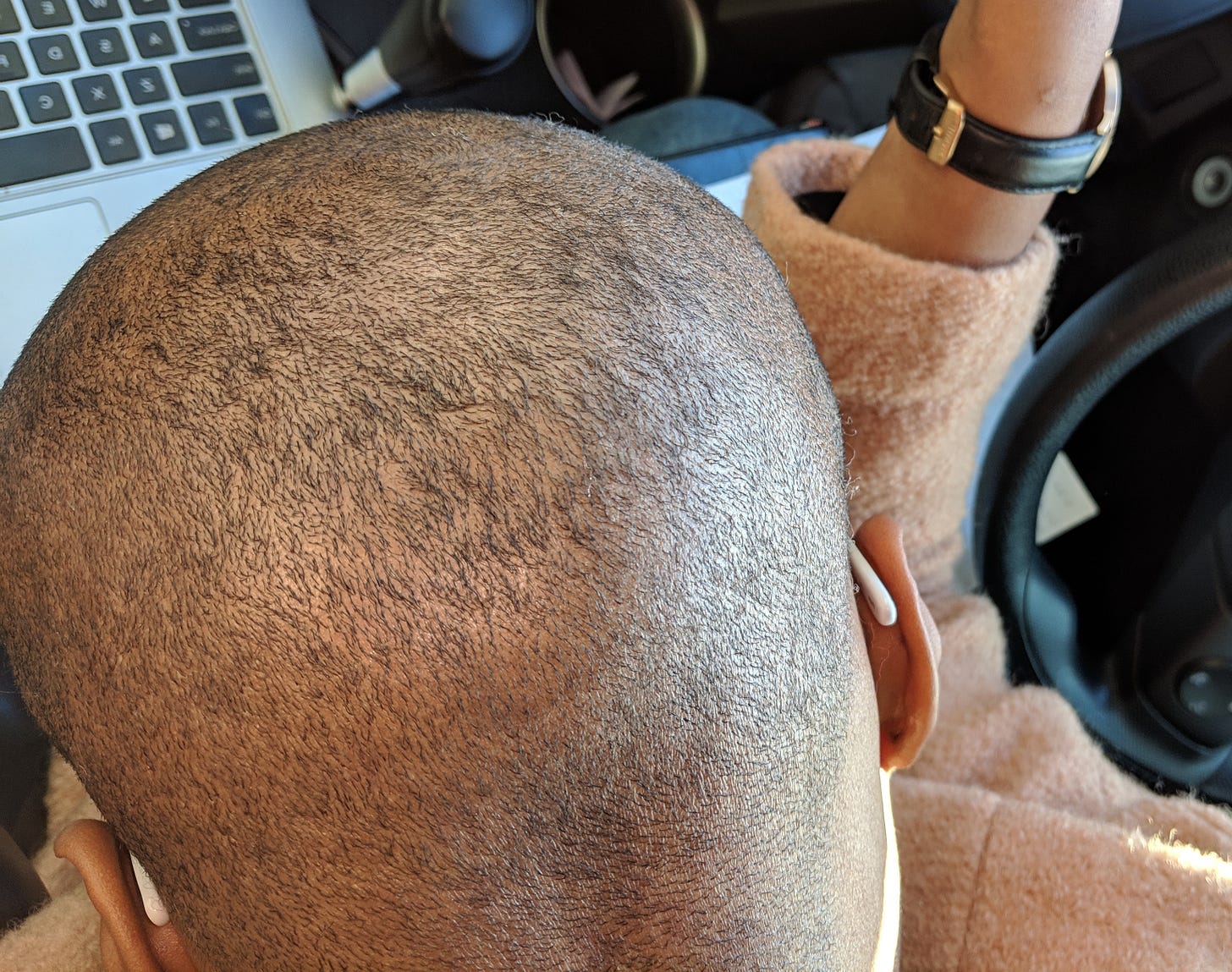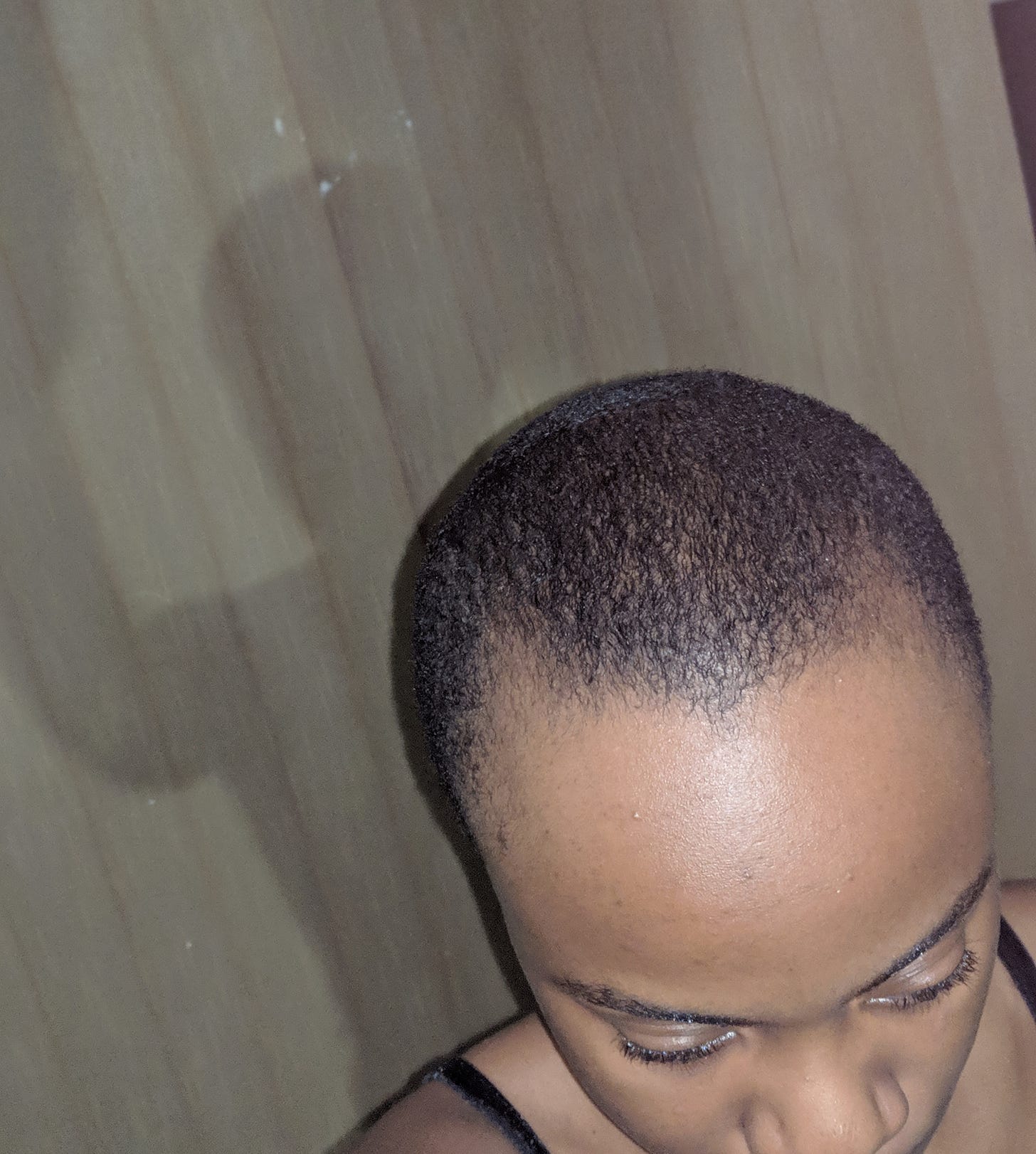To forgive is simple. Shave your head.
some hidden milestones still matter
I heard this one before.
“Lynn, you’re so impulsive!”
So, I smiled. I had a gut feeling something was coming. Probably a comment that I didn’t want to hear.
She said, “most people when they clean an oven door glass, they take two steps:
spray and wipe the outside, then spray and wipe the inside. They don’t take the whole thing apart.”
“oh interestiinggg. They do!!” I replied, half‑teasing.
But I kept thinking: Even if there’s that dark brown river of grease staring at me? I’m just supposed to ignore it? Oh no, that mess can’t live rent-free in my house.
This oven door is coming off today. Not tomorrow.
Then she added:
“And remember that Saturday you went to wash your hair—and came out completely bald the next day.”
“ Uhm. I do not recall,” I said knowing fully well what she meant.
But later, I realized: How could I hide my forehead… when there’s no hair to begin with? And maybe that was the point.
Eventually, to heal, don’t we need to break the mold?
Growing up, I was picked on. So I would hide part of my face everywhere I went. Grocery store. Concert stadium. School. Anywhere, really. I didn’t want to give others a reason to make me feel small. But even after hiding in shame, I still felt angry. Empty. And lowkey plotting revenge on every single one of them.
But God slowly allowed me to forgive them while I was a junior in high school. I knew their names and faces so well. But ask me now? Nothing comes to mind.
As I learned to let go of this internal anger, I got more of Jesus, His love and heart. My faith had become my own. And I got baptized on Saturday, December 12, 2015. Still, we all know that healing takes time, even with God in the picture. Shame tied to my hair. And on Saturday, December 11, 2018, it had to go.
There was this nudge I couldn’t ignore. It kept saying: If your worth and beauty are tied to something material, it has to go. And did I want to do it? Of course not. What would my family think? Do I really want to give my 75 year old grandma a heart attack? Probably she will start saying, “Oh no, we lost her.”
But eventually, I did it. Shaved everything off. It wasn’t an impulsive haircut. It was a deep cleaning, emotionally and spiritually. And weirdly enough, it helped me understand something I hadn’t seen clearly before.
I already knew Jesus as our advocate in front of God the Judge. We sin, hurting Him, others, and ourselves, and yet, He defends us. When we ask Him to forgive us, He presents our case better than a top 1 percent lawyer ever could. But letting go of my hair helped me find three missing pictures of God:
Shame and Honor – we don’t have to cover our insecurities with titles, job offers, or fake confidence. He will handle it.
Love and Justice – they aren’t opposites. With God, they work together. Always.
Lost and Found – we don’t need to perform to be worthy. We already are.
For me, that meant:
Showing up, not hiding.
No longer trying to be “good enough.”
Being loved beyond my wounds and past hurts.
How could someone experience this type of love and not forgive?
Forgiveness is wild because it feels like someone is getting away with something. So we hold onto bitterness and say, they don’t deserve it.
Yet, that is kind of the point. We forget we didn’t deserve it either when Jesus forgave us. And the tricky place we find ourselves is this: If we don’t forgive, those people who hurt us? They still control us.
When we take matter in our own hands to prove a point, rub it in their faces… oh no, we aren’t just hurting them. We are hurting ourselves, becoming just like them. Even years after they are dead, long gone, they are still controlling you.
And when we live like that, it means we haven’t fully accepted Jesus’ forgiveness. We think we have to perform to get His love. And we start expecting others to do the same. But God’s love is not earned; it is unconditional.
Joseph was my favorite Bible character growing up.
He knew what it felt like to be rejected by the people closest to him. His brothers. His employer. His friends. They forgot him in jail when they promised… “I will be there for you. I will remember you.”
He had no one to lean on. But one. He kept talking to God in his pain. Somehow, Joseph forgave them. All of them. That was the Old Testament, friends. Before the Holy Spirit was available to everyone who said YESSS! to Jesus’ salvation gift.
Isn’t that something?
We have Someone now to hold our hands when forgiveness feels too big. But Joseph? He didn’t. Not like we do.
So, how much more should we forgive those who hurt us?
Heart Call:
To forgive, we need to keep reminding ourselves of God’s full picture. If we lean on Love and not Justice, we lose sight of God’s heart.
What are you holding onto as a special type of covering
for your value (to be enough)?
Is there someone you need to forgive?



